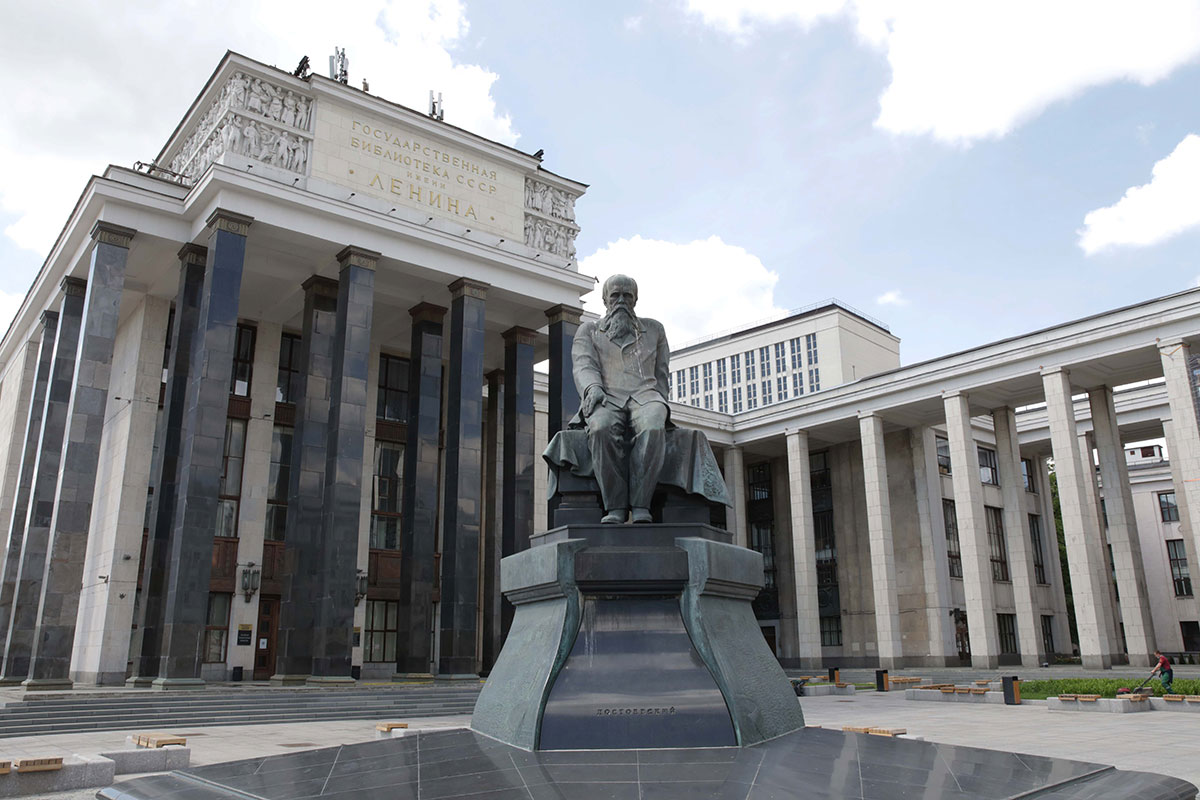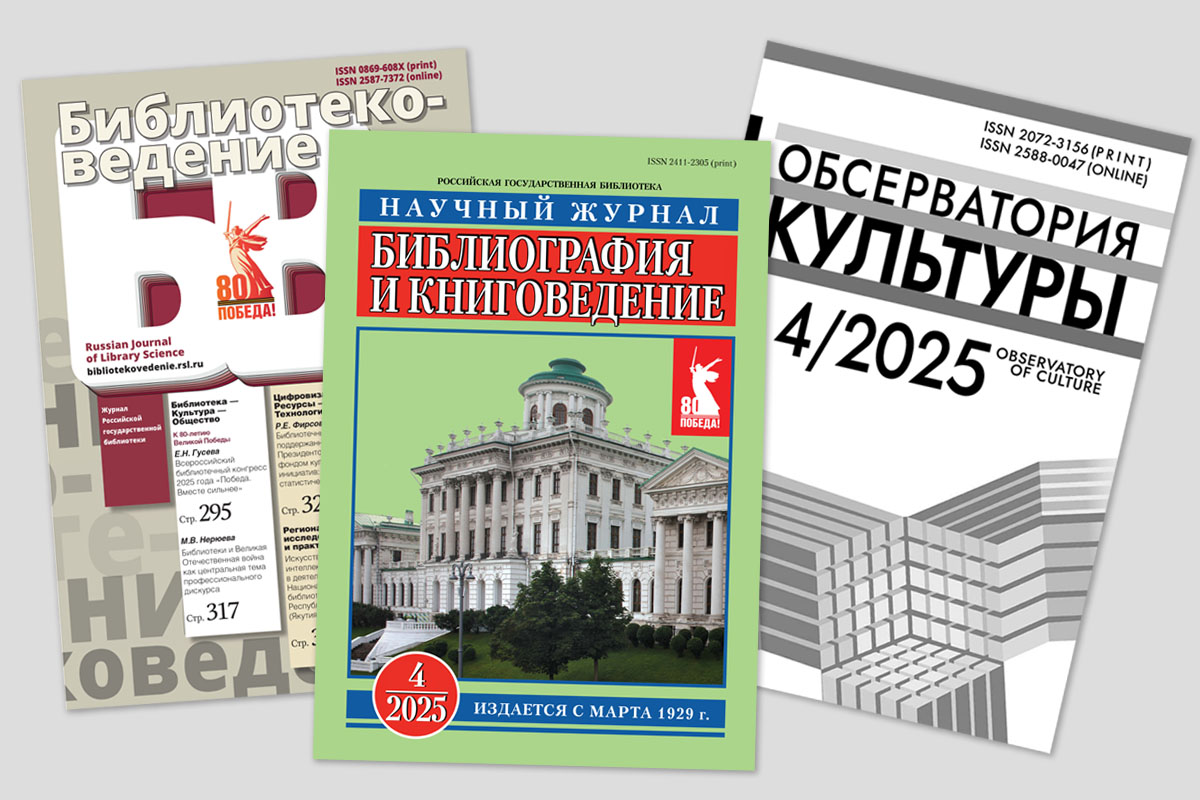
"Bibliotekovedenie [Russian Journal of Library Science]" is a full-colour illustrated peer-reviewed journal on research and practices in the field of library management and book trade considered along the dimensions of informational and communicative culture.
Regarding libraries as one of the most important social institutions in the field of culture, science, humanities, education and communications, the journal addresses an extensive range of issues related to the content and structure of library-based activities. It considers library function against the background of the related global developments, both in practical and conceptual terms, integrated into a wider social and cultural context and interrelated with the humanitarian challenges of the modern world.
Scientific-practical peer-reviewed Journal Bibliotekovedenie [Library and Information Science (Russia)] is officially certified by the Higher Attestation Commission of the Russian Ministry of Science and Higher Education for publishing the main results of dissertation research.
The Editorial Board accepts only original research
papers which have not been published elsewhere.
The journal publishes research materials, which meet Focus and Scope of the journal, on Library and Information Science, Bibliography Science, and Bibliology under the following Science Classification Codes:
• 05.25.00 Document Information
• 07.00.00 Historical Sciences and Archeology.
The members of Editorial Council are world-known researchers, the recognised authorities in the relevant fields of culture, education, science and humanities.
The members of Editorial Board are researching fellows of greatest libraries and universities, branch leaders, PhD (candidate’s) and doctoral degrees holders.
The journal is directed to the audience of librarians and information managers, researchers in library and book trade studies, bibliographers, academics, postgraduates, high school and university students taking courses in Arts and Culture, amateur book-lovers and collectors etc.
The journal is published by the Russian State Library since in 1952.
6 issues p/a (60×90, 1/8, circulation — 650, 112 pages).
Subscription codes: 87322 (half a year), 93612 (for a year) — in the joint catalogue “Pressa Rossii” (Russian Press).
Current issue
FIRST PAGE
LIBRARY - CULTURE - SOCIETY
BOOK - READING - READER
IMAGES - PEOPLE - DESTINIES
HISTORICAL EXPERIENCE AND RECONSTRUCTIONS
Announcements
2026-02-02
Всероссийский семинар «Признание обществом заслуг ветеранов СВО: роль библиотек»
 Российская государственная библиотека и Российская библиотечная ассоциация приглашают принять участие во Всероссийском научно-практическом семинаре о роли и возможностях библиотек в оказании поддержки ветеранов специальной военной операции и членов их семей.
Российская государственная библиотека и Российская библиотечная ассоциация приглашают принять участие во Всероссийском научно-практическом семинаре о роли и возможностях библиотек в оказании поддержки ветеранов специальной военной операции и членов их семей.
2025-12-30
Почетная грамота Президента РФ
 Главный редактор журнала «Библиотековедение» Александр Юрьевич Самарин, заместитель генерального директора РГБ по научно-издательской работе, доктор исторических наук, доцент, заслуженный работник культуры Российской Федерации, награжден Почетной грамотой Президента Российской Федерации За активное участие в подготовке и проведении общественно значимых мероприятий (Распоряжение Президента РФ № 514-рп, от 29.12.2025).
Главный редактор журнала «Библиотековедение» Александр Юрьевич Самарин, заместитель генерального директора РГБ по научно-издательской работе, доктор исторических наук, доцент, заслуженный работник культуры Российской Федерации, награжден Почетной грамотой Президента Российской Федерации За активное участие в подготовке и проведении общественно значимых мероприятий (Распоряжение Президента РФ № 514-рп, от 29.12.2025).
Поздравляем Александра Юрьевича и желаем ему новых творческих достижений!
2025-09-19
Научные журналы РГБ вошли в Белый список
 Завершена работа по формированию Единого государственного перечня научных изданий — Белого списка, который в скором времени заменит Перечень ВАК. В российскую часть нового списка вошло 3120 журналов, распределённых по 4 уровням, где 1-й уровень — самый высокий. Белый список опубликован на сайте Российского центра научной информации 12 сентября 2025 года.
Завершена работа по формированию Единого государственного перечня научных изданий — Белого списка, который в скором времени заменит Перечень ВАК. В российскую часть нового списка вошло 3120 журналов, распределённых по 4 уровням, где 1-й уровень — самый высокий. Белый список опубликован на сайте Российского центра научной информации 12 сентября 2025 года.
| More Announcements... |











































